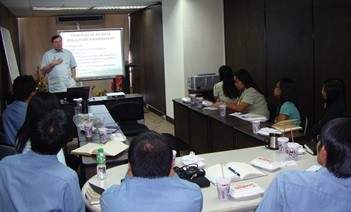Speeches Shim

Climate change poses an increasing threat to sustainable economic and energy development. The growing concerns on the massive environmental destruction arising from climate change generated significant political momentum for action on greenhouse gas emissions. The Renewable Energy (RE) Act of 2008 and the Biofuels Law of 2007 provided the legal impetus to push for concrete actions to achieve substantial reduction in greenhouse gas emissions. USAID responded to the international challenge to provide development assistance to developing economies, which are likely to bear the most consequences of climate change.
Through the Climate Change and Clean Energy Project (CEnergy), USAID supports the Philippine government’s progressive response to address energy security and combat climate change and the government’s integrated strategy to climate and energy policy that aims to curb the rapid progress of climate change. The project focuses on the power and transport sectors, which have been identified as the major sources of the country’s greenhouse gas emissions. It adopts a multi-pronged approach that is designed to mitigate climate change through improved utilization of clean and renewable energy in power and transport. CEnergy also aims to capitalize on existing collaboration among key government entities, the private sector, civil society, media, transport groups and the academe. The project serves as a vehicle to ensure that the various laws that have been passed, including the Electric Power Industry Reform Act of 2001 (EPIRA), are mutually complementary and supportive to the investment community
TASKS
The project’s implementation is envisaged to be carried out through four parallel but mutually supportive tasks.
Improve Policy Implementation. This component provides technical assistance for the effective implementation of energy policies with the higher objective of increasing the amount of renewable and clean energy sources in the country’s primary energy mix. This task aims to address possible barriers that may impede increased investments in renewable and clean energy sources. CEnergy recognizes that the appropriate interplay among the different energy laws will create the platform needed to attract private investments into the sector. CEnergy works closely with the Department of Energy (DOE) as well as with other government agencies that play fundamental roles in the effective implementation of the different clean energy laws.
Improve Regulatory Capacity. Energy regulation plays an integral role in ensuring a level playing field for private stakeholders. As such, CEnergy provides technical assistance to the Energy Regulatory Commission (ERC) aimed at institutional strengthening through a series of regulatory trainings and hands on workshops. The passage of the RE Act of 2008 gave the regulatory body additional mandates that put to test its ability to be the primary bastion of the electric power industry. To date, CEnergy has conducted regulatory trainings designed to increase the technical competence of the ERC and its staff.
Promote Climate Change Mitigation. Activities under this task include technical and skills training in greenhouse gas accounting, inventory and management. These skills are requisite for the Philippines to fully exploit emerging business opportunities spawned by global initiatives to carbon emission abatement. In partnership with the Department of Transportation and Communication, the Project also supports initiatives by selected local government units to abate pollution in their respective communities.
Build Public Understanding and Support. Increasing the level of public awareness and understanding of issues involving energy reforms and climate change is central to the successful implementation of all the other tasks under CEnergy. Effective policy implementation calls for the pro-active and full cooperation of the different sectors of the society. The project aims to equip all stakeholders with the right information, educate the public on the issues and the corollary solutions, and appropriately communicate these solutions.
GOAL
Mitigate climate change through the improved utilization of clean and renewable energy in the power and transport sectors
OBJECTIVES
- Increase the overall efficiency, reliability, and transparency of energy services to promote investment and utilization of clean energy sources;
- Increase the share of clean and renewable energy in transport and power in the primary energy mix in accordance with the Philippine Energy Plan; and
- Reduce GHG emissions from the power and transport sectors in accordance with GPH targets
IMPLEMENTATION PERIOD
May 2010 – February 2014

Comment
Make a general inquiry or suggest an improvement.